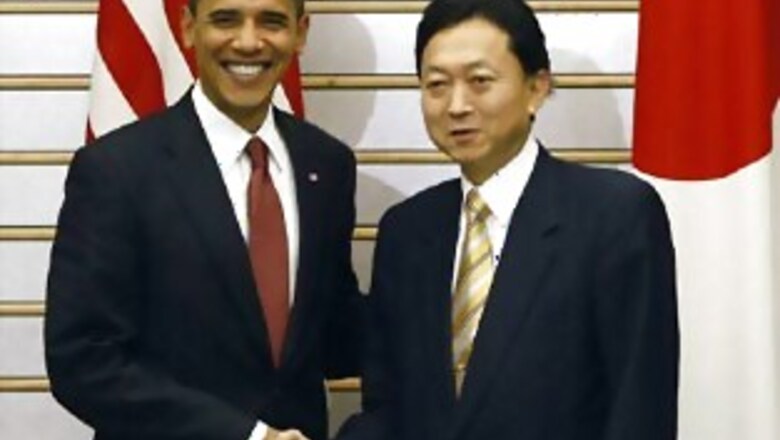
views
Tokyo: US President Barack Obama and Japan's new Prime Minister, Yukio Hatoyama, pledged on Friday to revitalise their strained security alliance as they adapt to a rising China, set to overtake Japan as the world's No 2 economy.
But they left unresolved a feud over a US military base on Japan's southern Okinawa island that has frayed Washington's ties with Hatoyama's government, under pledge to steer a diplomatic course less dependent on its ally and forge closer relations with Asia.
"I told him that the US-Japan alliance is the cornerstone of everything," Hatoyama told a news conference after their summit. "But given the changing times and global environment, I would like to deepen the alliance and create a new US-Japan alliance that is constructive and future-oriented."
Obama, on his first Asian tour as leader, agreed.
"Our alliance will endure and our efforts will be focused on revitalising that friendship so that it's even stronger and more successful in meeting the challenges of the 21st century."
Tokyo is the first stop in Obama's nine-day Asian tour that takes him to Singapore for an Asia-Pacific summit, to China for talks on climate change and trade imbalances, and to South Korea, where North Korea's nuclear ambitions will be in focus.
Hatoyama and Obama agreed on a plan to review their alliance over the next year, with a view to deepening it as they celebrate the 50th anniversary of their security treaty in 2010.
But assuaging anxiety and beginning to define a new direction for the alliance will be a difficult task, as will be resolving the dispute over the US Marines Futenma air base.
"They are both determined to avoid public disagreements and to put off, for a little while, the issues they cannot resolve, namely bases. But they won't be able to put them off for too long," said Daniel Sneider, associate director for research at Stanford's Walter H. Shorenstein Asia-Pacific Research Center.
Obama said Washington and Tokyo were equal partners already and stressed that the alliance was strong and vital.
But he made clear that he wants Tokyo to implement a 2006 deal under which Futenma, located in a crowded part of Okinawa, would be closed and replaced with a facility in a remoter part of the island.
Replacing Futenma is a prerequisite to shifting up to 8,000 Marines to the US territory of Guam, part of a broader realignment of American forces in Japan.
REFRAMING THE ALLIANCE
Hatoyama said before the election that the base should be moved off Okinawa, fanning hopes of the island's residents, reluctant hosts to more than half the US forces in Japan.
"The United States and Japan have set up a high-level working group that will focus on implementation of the agreement that our two governments reached with respect to the restructuring of the US forces in Okinawa and we hope to complete this work expeditiously," Obama said.
Hatoyama echoed Obama's desire for an early solution, but said finding one would not be easy.
"This is a difficult issue. But as time passes, it could become even harder to reach a solution," Hatoyama said.
The two leaders sought to stress the positive, agreeing to cooperate in fighting global warming and promoting nuclear disarmament, while calling on North Korea to rejoin stalled six-party talks on its nuclear arms programme.
"The United States and Japan, with the other members of the six-party talks, will continue to work to show North Korea that there is a pathway, a door, for them to rejoin the international community that would serve their people well and, I believe, enhance their security over the long term," Obama said.
"They have to walk through that door."
But while Obama and Hatoyama found common ground, the allies have their work cut out to reframe the alliance to adjust to changing regional and global dynamics.
China is forecast to overtake Japan as the world's second-biggest economy as early as next year, raising concerns in Japan that Washington will cosy up to Beijing in a "Group of Two" (G2) and leave Tokyo out in the cold.
Obama will spend just 24 hours in the Japanese capital compared to three days in China, where he will discuss revaluing the yuan and encourage Chinese consumers to spend and to open Chinese markets further.
Hatoyama, though, said he was unworried by China's rise.
"It's natural when we consider the size of China's population. There's no need to feel pessimistic about it," he said in an interview with Channel NewsAsia.
"Rather, I'm optimistic about Japan. We should run an economy that suits our size."













Comments
0 comment